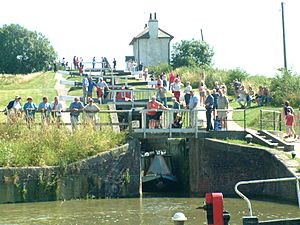Foxton Locks facts for kids
Quick facts for kids Foxton Locks and Inclined Plane |
|
|---|---|

Upper staircase of Foxton Locks
|
|
| Location | Leicestershire, UK |
| Built | 1813 and 1900 |
| Architect | Benjamin Bevan (Canal & Locks), Gordon Cale Thomas (Inclined Plane) |
| Governing body | Canal & River Trust |
|
Listed Building – Grade II*
|
|
| Official name: Foxton Locks, Grand Union Canal Leicester line | |
| Designated | 7 December 1966 |
| Reference no. | 1360753 |
|
Listed Building – Grade II
|
|
| Official name: Lock-Keeper's Cottage adjacent to Foxton Top Lock | |
| Designated | 9 March 1989 |
| Reference no. | 1360774 |
|
Listed Building – Grade II
|
|
| Official name: Lock-Keeper's Cottage with adjoining stable block and Foxton Canal Craft Shop, adjacent to Foxton Bottom Lock, Grand Union Canal | |
| Designated | 9 March 1989 |
| Reference no. | 1061459 |
| Official name: Inclined Plane immediately east of Foxton Locks | |
| Designated | 24 January 1973 |
| Reference no. | 1018832 |
| Lua error in Module:Location_map at line 420: attempt to index field 'wikibase' (a nil value). | |
Foxton Locks (grid reference SP691895) are a famous set of ten canal locks in Leicestershire, England. They are part of the Grand Union Canal and are located about 3 kilometers west of Market Harborough. These locks are named after the nearby village of Foxton.
The locks are special because they are built as two "staircases," each with five locks. This design helps boats climb a steep hill. They mark the start of a 20-kilometer high section of the canal that goes past places like Husbands Bosworth and Crick. This section ends with another set of locks called the Watford Locks.
Next to the locks, you can find the remains of the Foxton Inclined Plane. This was a huge machine built in 1900 to help boats move up and down the hill faster than using the locks. However, it wasn't used for very long and was taken apart in 1926. Today, there's a project to rebuild it because the locks can still get very busy with boat traffic.
Contents
What Are Staircase Locks?
Staircase locks are a clever way to move boats up or down a steep slope on a canal. Imagine a series of steps, but for boats! Each lock opens directly into the next one. This means the bottom gates of one lock are also the top gates of the next.
Foxton Locks are the biggest set of staircase locks in England. They have special areas called "side pounds." These are like extra pools of water next to the locks. When a lock is emptied, some of its water goes into a side pound instead of being completely wasted. This saves water, especially when boats are going in different directions.
History of Foxton Locks
Building the Foxton Locks was a big project that started in 1810. It took four years to complete. The locks officially opened for boats on October 1, 1813.
Not much changed at the locks until the Foxton Inclined Plane was built. When the inclined plane was working, the locks were used less. In 1908, money was set aside to make sure the locks could be used fully again, even at night.
In 2008, Foxton Locks became part of the European Route of Industrial Heritage. This is a special network that highlights important historical industrial sites across Europe.
Today, the locks are usually staffed by helpers from Easter until October. They are locked at other times to make sure there's enough water and to manage boat traffic. Even though it can be busy, going through the locks usually takes about 45 minutes to an hour. It's quicker because the locks are narrow, and the gates are easy to open.
Visiting Foxton Locks
Foxton Locks are a very popular place for visitors. They are considered a special historical site. The local council has even created a country park at the top of the locks.
At the bottom of the locks, where a smaller canal branch goes towards Market Harborough, you'll find lots of things to do. There are two public houses (pubs), a shop, and even a boat that takes people on trips. It's a great spot for people who enjoy walking or learning about history.
The Foxton Canal Museum is also located here. It's in the old building that used to house the steam engine for the inclined plane. The museum tells the story of the locks and the inclined plane. It also shares what life was like for the people who worked on the canals. You can also see a collection of special pottery called Measham pottery. The museum opened in 1989 and is a recognized museum.
Other Canal Locks to See
- Bingley Five Rise Locks in West Yorkshire
- Bingley Three Rise Locks in West Yorkshire
- Watford Locks in Northamptonshire
- Caen Hill Locks near Devizes, Wiltshire
- Fourteen Locks near Newport, South Wales
- Tardebigge Locks near Bromsgrove, Worcestershire
Images for kids
 | Ernest Everett Just |
 | Mary Jackson |
 | Emmett Chappelle |
 | Marie Maynard Daly |


